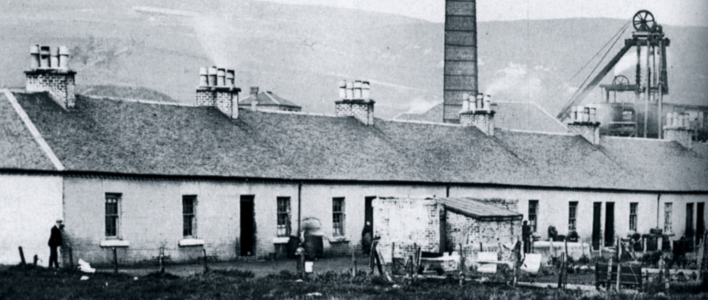MSc work placement student Kaysha Watson from the University of Strathclyde looked into the links between football and Glenbuck for the Lost Villages.
The importance of sport in Scottish culture and the history of sporting figures in Scotland has always attracted a degree of attention. In Scotland the period between the middle of the nineteenth century until the outbreak of World War One and after the war until the Second World War saw the emergence of a sporting culture very different from the past. Across the UK, mining villages had a strong connection to the footballing world. So much so, that what once was a thriving coal mining community in Ayrshire, the small remote village of Glenbuck was home to pioneers of the game, producing fifty professional footballers, six Scottish internationals, four FA Cup winners and, most famously, Liverpool manager Bill (Willie) Shankly.
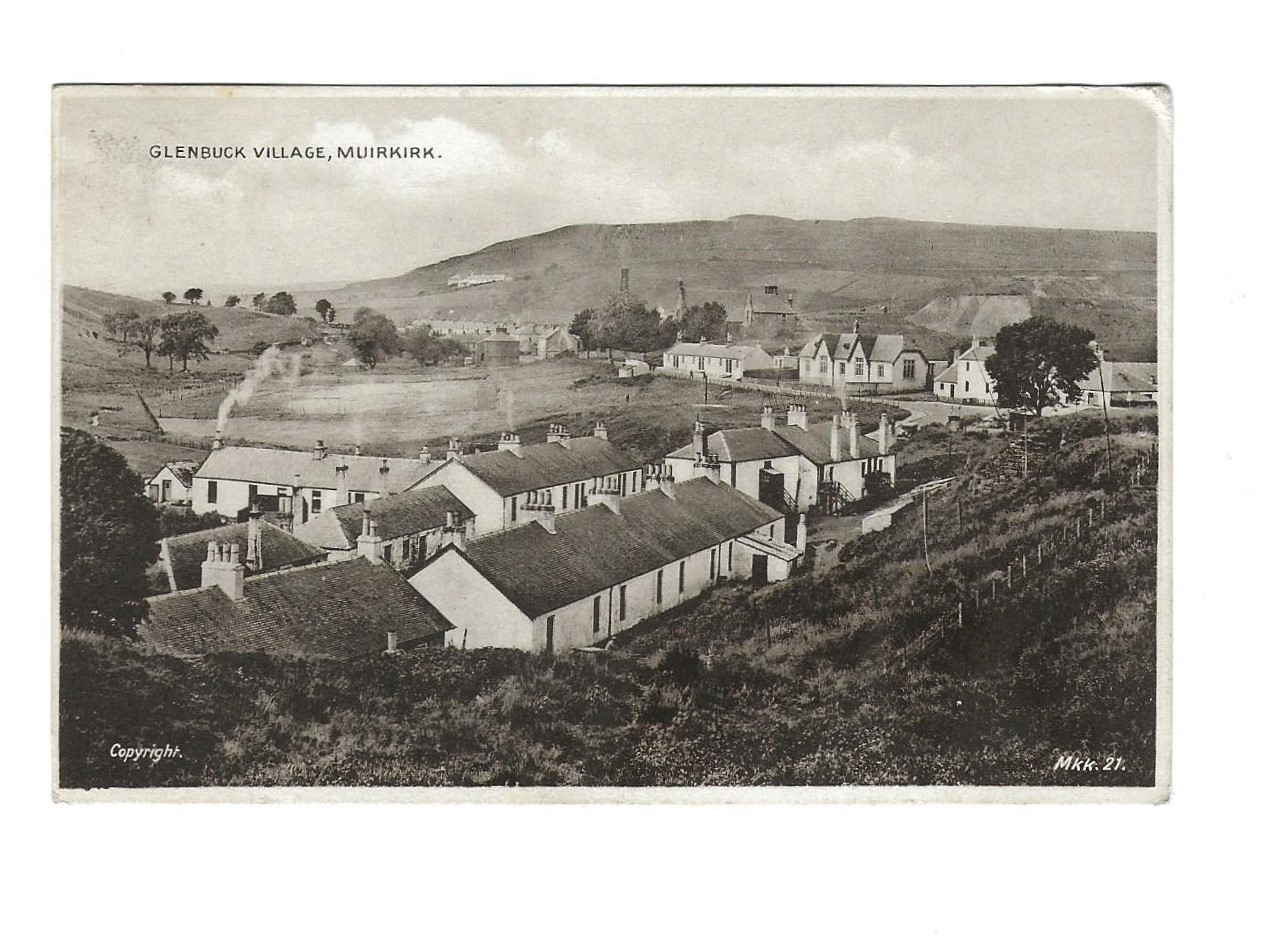
IMAGE: Postcard of Glenbuck, n.d, donated from Mathie Family collection
For more than half a century, the typical Scottish mining village of Glenbuck, whose population did not exceed 1700 flourished where football was concerned. The small remote village was so poor that it had no electricity or indoor toilets. Listen here to Sam Purdie describe the living conditions. This was at a time when life was hard and the nature of the work sustained the village, working in the pit for the men was hard and a back-breaking graft. Outside the pit, young men would make their own entertainment and it just so happened that young men spent most of their spare time playing football. Fathers of these young men in the mines knew the risks when it came to working in the pit and would go onto encourage their sons to have a career in professional football. In Glenbuck, mining and football went hand-in-hand, young men would work in the mines, thereafter it was normal for workers to spend the rest of their time playing football. The village football pitch was Burnside Park and only a short walk away from the pit. It is clear that there was a strong desire by these young men to get out of the mines and would show this determination within their game. As Tom Hazel, in the ‘Making Shankly’ documentary stated, ‘Boys were desperate to get out of the pit, so they had to be good at football’. In general, playing football allowed these men to display qualities of independence and accept the consequences of their actions, football essentially allowed these men to live in the moment – for at least 90 minutes. In the hours out of the mines, the young men in Glenbuck would play against other young men from different mines increasing the level of competitiveness amongst them.
Most famously, The Glenbuck Cherrypickers (formally known as Glenbuck Athletic) was the starting point for many of these young men on the pathway to professional football. In Glenbuck, the close-knit community meant that The Cherrypickers was largely a family affair, due to the size of the village many of the young men who played on this team were related to one another. The success of The Cherrypickers cannot be ignored and by the 1930s, prior to the decline of the club they had won the Ayrshire Junior Cup in 1889,1890 and 1891. In 1906, they also won the Ayrshire Charity Cup, Cumnock Cup and Mauchline Cup.
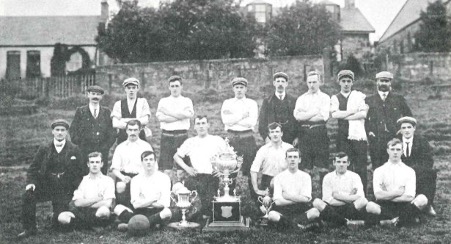
IMAGE: The Glenbuck Cherrypickers team pictured with their trophies. Far left in the back row is John Shankly, father to the Shankly brothers. In the background of this picture, top left, is the house that belonged to the Shankly family
Famously referred to as ‘the Glenbuck son’, Bill Shankly’s legacy still lives on to this day in the city of Liverpool. When people today think of Bill Shankly, very rarely do they remember where he came from in Scotland and tell the tale of his home roots. When hearing of the Glenbuck Cherrypickers, there is an assumption whereby this is the team that Bill Shankly began his career. However, this was not the case, as the youngest Shankly brother, by the time Bill was old enough to play for the local team they had disbanded. Instead, Bill played for Cronberry, a junior team 12 miles from the village where he was scouted by Carlisle United, which essentially kick started his footballing career. Coming from a large family, consisting of 10 siblings (5 boys and 5 girls), surprisingly all five boys went onto have careers in professional football. Taking this number and putting it into perspective, Glenbuck had a population that never exceeded 1,700 and produced fifty professional footballers in over forty years, 3.12% of these young men became footballers. In comparison if we take a large city like London and apply these figures with a population of 8.67 million, they would have produced 270,424 footballers and putting that into perspective worldwide there are only 65000 professional football players.[1] Unlike todays footballing world, there was not the same level of money in the game and back at this time, it was very much a working class sport with those involved keeping close their most important values and lived very humble lives throughout their careers.
During Bill Shankly’s career, he spent only one season at his first club Carlisle United before spending the rest of his playing career with Preston North End with whom he won the FA Cup in 1938. What becomes clear in the newspaper articles concerning the rise of football players from the village of Glenbuck is the support and praise they have for their own, especially the young men who began their footballing careers at The Cherrypickers. A few to mention were Johnny Crosbie and Bob Blyth (Bill Shankly’s uncle), both had very successful playing and managerial careers. The Muirkirk Adviser, 1931 kept note of the successes of the former Glenbuck players and were very keen to display their progression in football.
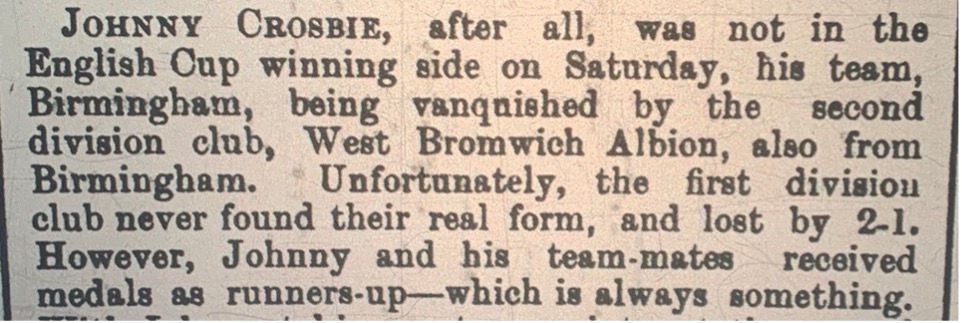
The Muirkirk Advertiser, 30th April 1931
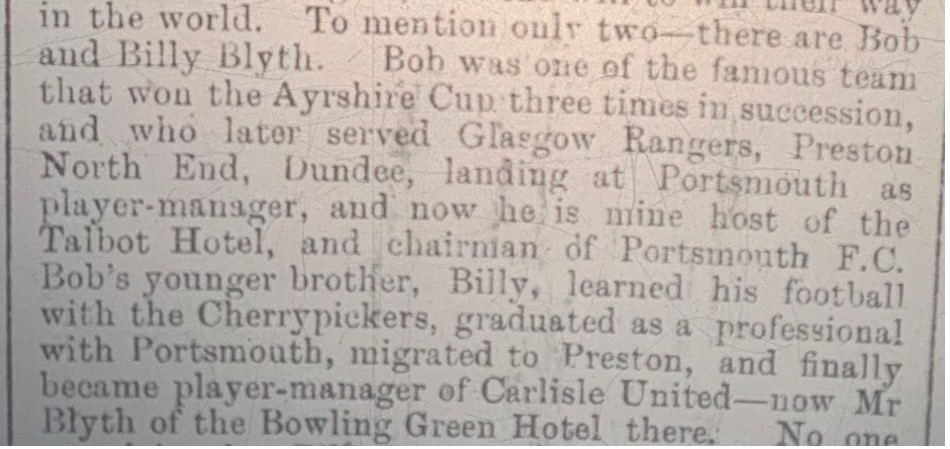
The Muirkirk Advertiser, 6th August 1931
Each week the local newspaper would provide a column dedicated to football and more often than not it displayed the achievement of the former Cherrypickers. To note, Bob Blyth was one of the very few players in history to rise as from a player, captain, player-manager, director, and vice-chairman.
The Glenbuck Village currently lies uninhabited and derelict with most of the history that has been discussed above completely gone. Unsurprisingly, the largest number of visitors to Glenbuck are Liverpool supporters who go to visit the memorial in honour of Bill Shankly, visiting the ‘lost village’ of their hero and Liverpool legend (See Spirit of Shankly). Fundamentally, football created a pathway out of the pit for these young men. All fifty men who made history in Glenbuck, their legacy lives on and makes up one of the most important stories to tell in the history of football in Scotland.
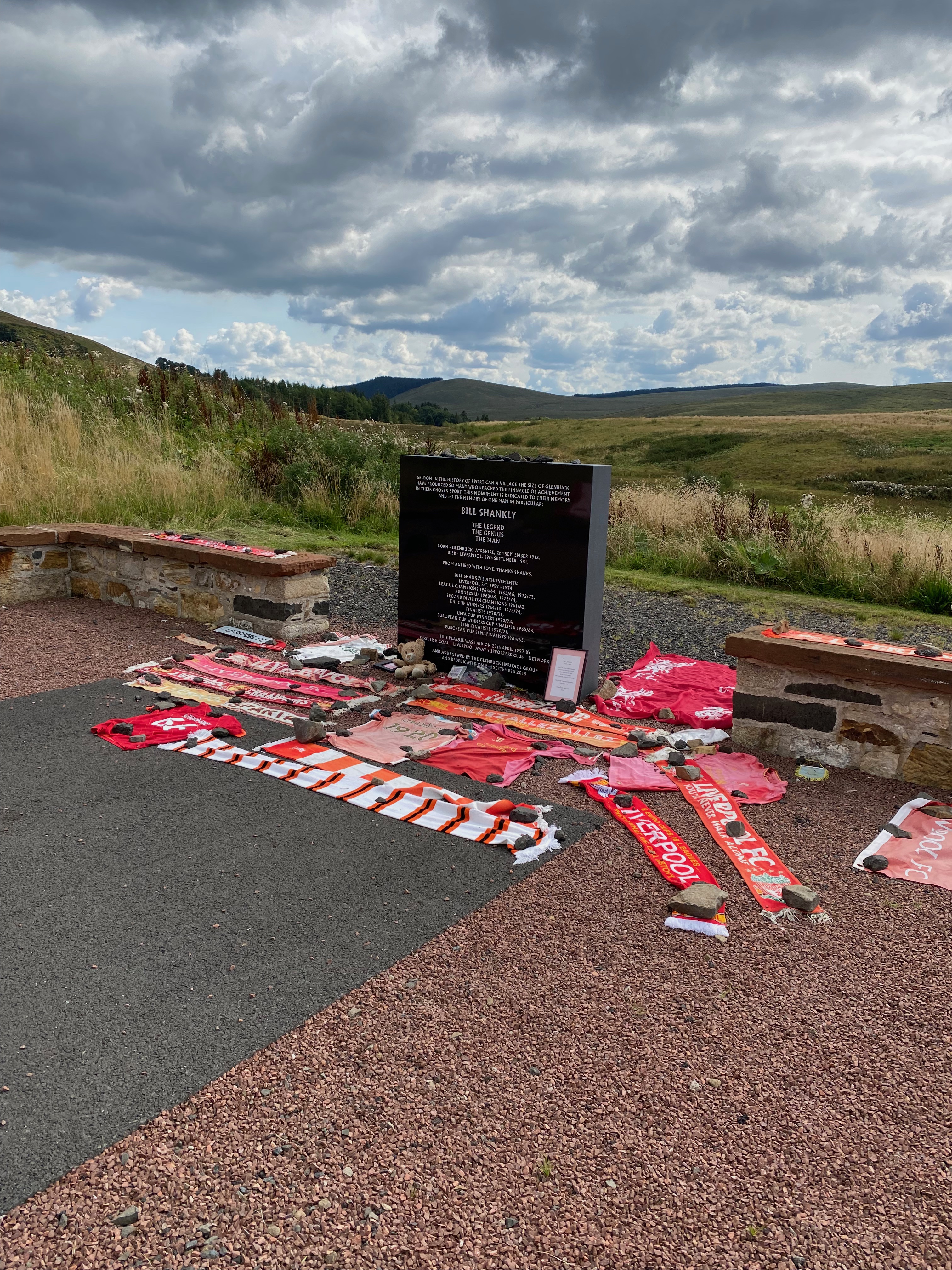
IMAGE: Memorial to Bill Shankly at Glenbuck, Lost Villages collection
Below is a poem written by Ken Bushnell called ‘Glenbuck Son ‘dedicated to Bill Shankly:
In Glenbuck he was born
From an Ayrshire mine he did rise
The man who would change so many lives
With the Cherrypickers he played the game
With Carlisle United he first found his fame
At Deepdale with Tom Finny he did play
Seven caps for Scotland he was proud to display
As a manager new tricks to learn
To Carlisle United he did return
At Grimsby he cast his net
The Glenbuck son’s destiny was set
Workingon and Huddersfield he did run
No to Liverpool in ‘51
Eight years down the line
An historic day in December ‘59
All would soon fear the famous THIS IS ANFIELD sign
Promotion in ‘62
Champions in ‘64
The Glenbuck son, Kopites did adore ’65 to Wembley in May
The Glenbuck son took the cup away
Now Into Europe he led his team
To be Champions of Europe was his dream
Cheated in Milan, all was doom and gloom
Now back home in his beloved boot room
The Glenbuck son would in a huddle
’73 he won a league and UEFA Cup double
May ’74 back at Wembley once more
Malcolm McDonald, what’s the score?
July, the Kopites heads are down
The Glenbuck son has relinquished his crown
[1] Making Shankly Documentary, https://www.amazon.co.uk/gp/video/detail/B07GSFC896/ref=atv_dp_share_cu_r
